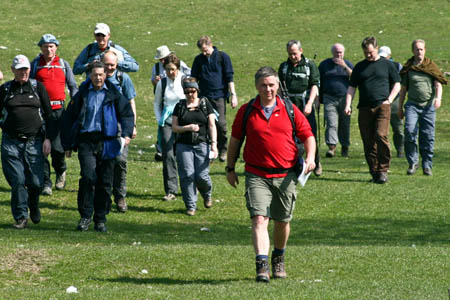
Walkers at Feizor during the launch event
More than 40 walkers stepped out in the footsteps of one of the most celebrated guidebook authors to celebrate the launch of a new book detailing one of his earliest routes.
A Pennine Journey charts the route enabling walkers to follow Alfred Wainwright’s 1938 walk from Settle in North Yorkshire to Hadrian’s Wall and back again. Wainwright Society member David Pitt has put together the guidebook, following the route as closely as possible for modern long-distance walkers.
The walkers retraced the first section of the walk on Saturday, leaving Settle station and heading to Stainforth in the Yorkshire Dales national park before returning via the hamlet of Feizor.
A Pennine Journey is Wainwright’s account of his trip up the backbone of northern England as Hitler’s Nazis threatened to turn an edgy Europe into a bloody battleground. The original book is a dark and foreboding retelling, published in 1986, of the young Wainwright’s trip through a rural world that was to disappear with the outbreak of the Second World Way.
The modern guidebook, which will be published by Frances Lincoln this summer, follows the writer’s route up the eastern edge of the Pennines to Hadrian’s Wall, which it then traverses for 64km (40 miles) before heading south from Greenhead and tracing the western side of the Pennines.
Wainwright Society spokesman John Burland said: “This illustrated guide is a recreation of this 1938 walk adapted for today’s roads and rights-of-way, taking a route that Wainwright might have chosen if he was planning it today.
“The route is 247 [398km] miles long and divided into 18 stages. With maps and illustrations inspired by the work of the great AW, this labour of love is essential for all those who wish to follow in Wainwright’s footsteps.”
The route passes through Horton in Ribblesdale, Buckden, Gunnerside, Bowes, Middleton in Teesdale, Westgate, Blanchland, Hexham, Housesteads, Greenhead, Alston, Milburn, Appleby, Kirkby Stephen, Garsdale Head, Sedbergh and Ingleton. It passes through some of the best scenery in Northern England and can be done either in daily stages or in its entirety – which the Wainwright Society said would typically take about 2½ weeks.